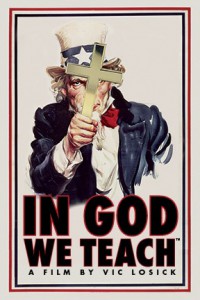Movie Review: In God We Teach

The new documentary film In God We Teach exposes the details of a prominent church-state separation incident at a public school in New Jersey to outline the difficulties in answering the general question: how should public schools deal with religion?
The case the movie takes on involves a student at Kearny High School, Matthew LaClair, and his American history teacher, David Paszkiewicz. In 2008 LaClair started recording Paszkiewicz because the teacher was openly preaching an evangelical form of Christianity in class, including the threat that some people “belong in hell.” LaClair, then a junior, confronted Paszkiewicz, who denied he said such things, not knowing he had been recorded. LaClair also recorded those denials.
Independent cameraman and documentary filmmaker Vic Losick’s film involved 18 months of interviews with LaClair and Paszkiewicz, along with Kearny residents and others who eventually got involved. There was never a legal suit filed, but the ACLU did eventually represent the LaClair family and a settlement was reached that required teacher retraining about church-state separation. The school board also enacted a prohibition against recordings on school property, which had been legal. The entire ordeal cost the school system about $120,000.
The film is open in its criticism of Paszkiewicz, who continues to claim he was set up. Losick does, however, let Paszkiewicz have his say without interference while struggling to describe his battling loyalties between what he believes his faith tells him to do and staying within legal boundaries. Paszkiewicz is shown engaging in other evangelical activities, such as handling out Bible tracts and leading a Christian youth group, where he describes why he doesn’t accept evolution and is instructed to evangelize.
LaClair is treated much better, with the film including several interviews with prominent supporters such as Neil deGrasse Tyson, Alan Dershowitz, and Kenneth Miller from Brown University. Paszkiewicz’s supporters in the film are primarily an attorney who is shown speaking at a school board meeting and his wife.
LaClair has since graduated and continues to speak out on issues related to church-state separation. The American Humanist Association awarded LaClair with the Humanist Pioneer Award in 2008 at a ceremony in Washington DC.
The Washington, D.C. premiere of In God We Teach took place Nov. 1, 2011 at the Newseum and was followed by a panel discussion that included Losick, Dr. Emile Lester, author of the research report Learning About World Religions in Modesto, California and Teaching about Religion in Public Schools, and author Dr. Charles Haynes, director of the Religious Freedom Education Project at the Newseum.
During Lester’s presentation following the film an overview was given of a class about religion that is now taught in Modesto, Ca. schools. It’s the nation’s only mandatory high school class on religion, although students can opt out. Lester told the audience how that class, which includes the basics on seven religions, has reduced tensions not only in the school but in the community at large. By allowing the community’s leaders to come together to create and monitor the class, religious tolerance is extremely high in the region Lester called “California’s Bible Belt.” He declared that “what is dear is decisive” to people and the power of religious belief must be respected. He asserted that when a society becomes polarized, extremists are sometimes the only choice, which makes tolerance tough to achieve.
In that vein, Lester made a suggestion that failed to pick up much support during the evening’s discussion. He said that, based on the Modesto model, maybe it would be a good idea for Intelligent Design to be taught in public schools. He didn’t suggest it be taught as science, but that a way should be found to include it so that people who find value in it don’t feel disrespected.
Neither his fellow panelists nor those who made comments from the audience would agree. Some of the approximately 200 people in attendance may have privately felt otherwise, however. Losick suggested as an alternative to a course on Intelligent Design that one be offered on the scientific method.
There was agreement between Haynes and Losick that classes about religion could be taught in schools, but with close monitoring. They also agreed that science classes should teach whatever the prevailing scientific consensus happens to be on any given topic, nothing more.
Haynes added that there is merit in the Modesto example because he has seen similar results in many other school systems around the country where he has been personally engaged to help set up guidelines for how religion and schools can successfully interact. He agreed with Lester that all parties need to be engaged from the start when putting the rules together, with courtesy and respect being maintained.
The questions and comments from the audience were also engaging and provocative. A questioner discovered that Modesto’s religion class does not include humanism, while another asked that we all stop using religious phrases like “believe” when taking about scientific topics such as evolution. It was also revealed that Kearny’s residents are still much divided, and LaClair and Paszkiewicz haven’t spoken since the incident.
